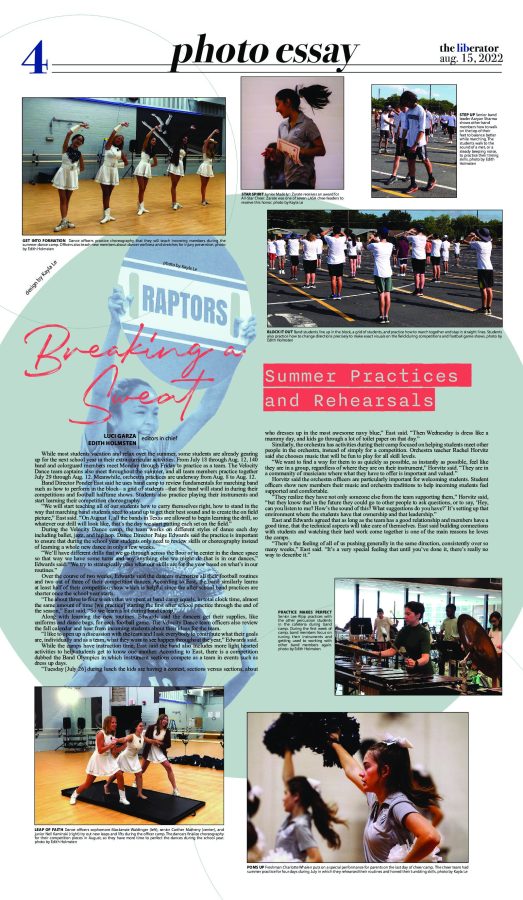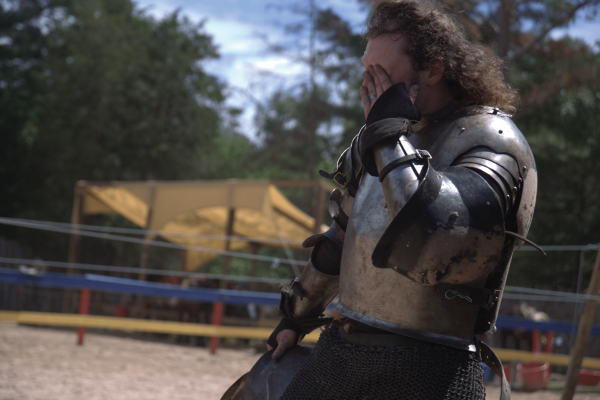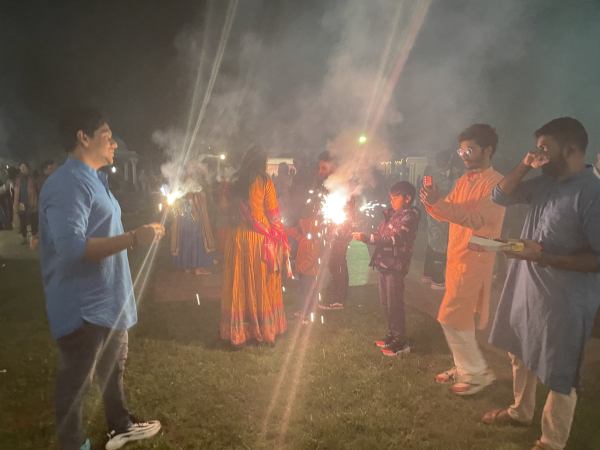Breaking a Sweat
Summer Practices and Rehearsals
August 20, 2022
While most students vacation and vedge out over the summer, some students are already gearing up for the next school year in their extra curricular activities. From July 18 through Aug. 12, 140 band and colorguard members meet Monday through Friday to practice as a team. The Velocity Dance team captains also meet throughout the summer, and all team members practice together July 29 through Aug. 12. Meanwhile, orchestra practices are underway from Aug. 8 to Aug. 12.
Band Director Ponder East said he uses band camp to review fundamentals for marching band such as how to perform in the block– a grid of students –that the band will stand in during their competitions and football halftime shows. Students also practice playing their instruments and start learning their competition choreography.
“We will start teaching all of our students how to carry themselves right, how to stand in the way that marching band students need to stand up to get their best sound and to create the on field picture,” East said. “On August 1, all the bands in Texas are allowed to begin learning the drill, so whatever our drill will look like, that’s the day we start putting each set on the field.”
During the Velocity Dance camp, the team works on different styles of dance each day including ballet, jazz, and hip hop. Dance Director Paige Edwards said the practice is important to ensure that during the school year students only need to review skills or choreography instead of learning a whole new dance in only a few weeks.
“We’ll have different drills that we go through across the floor or in center in the dance space so that way we have some turns and any anything else we might do that is in our dances,” Edwards said. “We try to strategically plan what our skills are for the year based on what’s in our routines.”
Over the course of two weeks, Edwards said the dancers memorize all their football routines and two out of three of their competition dances. According to East, the band similarly learns at least half of their competition show which is helpful since the after school band practices are shorter once the school year starts.
“The about three to four weeks that we spent at band camp equals, in total clock time, almost the same amount of time [we practice] starting the first after school practice through the end of the season,” East said. “So we learn a lot during band camp.”
Along with learning the new routines, Edwards said the dancers get their supplies, like uniforms and dance bags, for each football game. The Velocity Dance team officers also review the fall calendar and hear from incoming students about their ideas for the team.
“I like to open up a discussion with the team and I ask everybody to contribute what their goals are, individually and as a team, what they want to see happen throughout the year,” Edwards said.
While the camps have instruction time, East said the band also includes more light hearted activities to help students get to know one another. According to East, there is a competition dubbed the Band Olympics in which instrument sections compete as a team in events such as dress up days.
“Tuesday [July 26] during lunch the kids are having a contest, sections versus sections, about who dresses up in the most awesome navy blue,” East said. “Then Wednesday is dress like a mummy day, and kids go through a lot of toilet paper on that day.”
Similarly, the orchestra has activities during their camp focused on helping students meet other people in the orchestra, instead of simply for a competition. Orchestra teacher Rachel Horvitz said she chooses music that will be fun to play for all skill levels.
“We want to find a way for them to as quickly as possible, as instantly as possible, feel like they are in a group, regardless of where they are on their instrument,” Horvitz said. “They are in a community of musicians where what they have to offer is important and valued.”
Horvitz said the orchestra officers are particularly important for welcoming students. Student officers show new members their music and orchestra traditions to help incoming students feel supported and comfortable.
“They realize they have not only someone else from the team supporting them,” Horvitz said, “but they know that in the future they could go to other people to ask questions, or to say, ‘Hey, can you listen to me? How’s the sound of this? What suggestions do you have?’ It’s setting up that environment where the students have that ownership and that leadership.”
East and Edwards agreed that as long as the team has a good relationship and members have a good time, that the technical aspects will take care of themselves. East said building connections with students and watching their hard work come together is one of the main reasons he loves the camps.
“There’s the feeling of all of us pushing generally in the same direction, consistently over so many weeks,” East said. “It’s a very special feeling that until you’ve done it, there’s really no way to describe it.”





